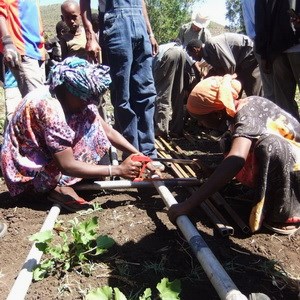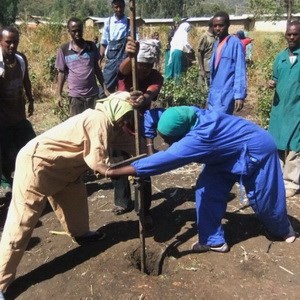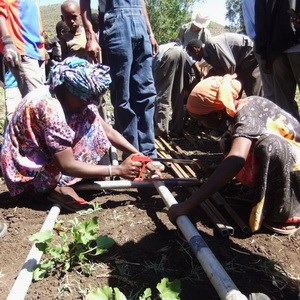Drilling for Change in Ethiopia
Ethiopia is one of the least developed countries in the world. In recent decades, terrible droughts and famines have endangered the livelihoods of thousands of individuals in their agriculturally based economy. This is a major contributing factor to the widespread, devastating poverty many Ethiopians are experiencing today.
Most Ethiopians live in rural areas, and many of these communities are familial. In isolated areas, extended families will live in groupings of thatched huts. Often the children will call one another "brother" and "sister" rather than "cousin," and adults are often referred to as "mother" and "father."
Seventy-four percent of the population lives in rural societies that occupy rugged highlands, forests, and plains, frequently outside the reach of clean water access. This statistic makes Ethiopia one of the least-reached areas in the world. Its lack of infrastructure makes the situation doubly difficult because many rural settlements do not have roads, and rough terrain makes it difficult for drilling operations to travel through.
Community empowerment
Tigist Teshome lives in one of these areas. She was born in Harewach'a, a town several hours east of Ethiopia's capital, Addis Ababa. Her village did not have access to potable water. All they had was an unprotected pond that put village members at constant risk for illnesses and disease. Not only was this their sole water source, but it was also an hour's walk away—a task that fell on the women and girls of the community.
Tigist was one of the few women who wasn't kept from school as a girl because of her water-fetching responsibilities. She was orphaned at age six but was still able to attend both elementary and secondary school. She was eventually trained as a teacher at East Hararege Zone College.

Women constructing a drill
After her graduation from college, she heard about World Vision's WASH (Water, Sanitation, and Hygiene) team training sessions, which taught local people how to operate manual drilling machines. Along with many other unemployed youth in her area, Tigist became a trained manual drilling operator. Tigist's entrepreneurial spirit eventually earned her the position of financial manager for the Burkito Bishan Manual Drilling Enterprise, which she co-founded in November 2012. She is a believer and expresses that her faith is an important part of what she does:
"Sometimes when we're working in remote areas, we have to keep on working through the weekends. For me, Sunday is the day that I worship my Lord, and so I want to go to church. But as I said, I have to keep on working on Sundays. I am able to accept this because deep down I know it's for a good cause, apart from earning a salary to support my family, I do it for my sisters who have to walk long distances to fetch water. I know because of our work they will be able to get clean water nearby. However, there are times, difficult times, that I believe if it had not been for my faith, I wouldn't have been able to make it this far."
Saving money, resources, and lives
Manual drilling is a new technology created by Water4 in conjunction with World Vision that is revolutionizing how local communities respond to clean water shortages. In the past, a large rig had to come and drill a well, costing $13,000 on average. Now in some areas, manual drilling can cut that cost down to $2,000.
The drills consist of a simple hand auger composed of local supplies. The drill is portable—all of the equipment can be folded into two bags and transported on a motorbike. With a small amount of training, this technology enables local entrepreneurs to drill wells for their own communities, improving health while boosting local business and supporting irrigation for household farms. Manual drilling also makes clean water access possible for communities that were previously inaccessible with traditional drilling equipment. For communities located on remote, harsh terrain, manual drilling is the only way they will receive clean water.

Women drilling for a well
In addition to providing manual drilling rigs and training for community members like Tigist, World Vision has partnered with the Desert Research Institute to provide high tech computer modeling and satellite imagery to locate shallow water tables and pinpoint areas where manual drilling can be utilized. World Vision is currently pushing to scale up their water work in countries like Ethiopia as part of their Campaign For Every Child, utilizing creative solutions to solve global issues that threaten to keep the next generation in poverty.
"God bless people from the U. S. for their support in creating job opportunities for us and our people to get clean water. Still," Tigist says, "Ethiopia faces a great problem."
Tigist attends Meseret Kiristos Church and is a member of the Merenata Choir. She was married last spring and is expecting her first child.
Organizations like World Vision, Water4, and the numerous other non-profits featured in this issue make it extremely simple to become involved with ending the global water crisis. If you feel led, don't hesitate to take advantage of the many resources available through these reliable organizations.
Amber Stenberg is the editorial intern at Today's Christian Woman. Follow her on Twitter @stenberg_a.
Subscribe to TCW's free email newsletter at this link for weekly updates and chances to win free books and music downloads.
Read more articles that highlight writing by Christian women at ChristianityToday.com/Women
 Read These Next
Read These Next
 Solving the Global Water CrisisIt takes more than wells to solve this worldwide problem.
Solving the Global Water CrisisIt takes more than wells to solve this worldwide problem. St. Teresa of ÁvilaThe story of the Christian mystic, Carmelite nun, and former patroness of Spain
St. Teresa of ÁvilaThe story of the Christian mystic, Carmelite nun, and former patroness of Spain
 Adventurous Sex?Why boredom in the bedroom is bad for your marriage
Adventurous Sex?Why boredom in the bedroom is bad for your marriage








 Homepage
Homepage


